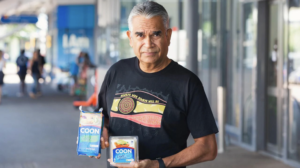Home » Commentary » Opinion » Coon cheese represents just one example of how cancel culture divides us
· The Australian
 Disintegrating into a collection of unfederated colonies, thanks to the sealed state borders and rivalrous premiers, is not the only threat facing Australia as it contends with Victoria-like eruptions of COVID-19. Another movement that has gathered momentum over the winter also might divide us, one from another, sowing the seeds of civil discord.
Disintegrating into a collection of unfederated colonies, thanks to the sealed state borders and rivalrous premiers, is not the only threat facing Australia as it contends with Victoria-like eruptions of COVID-19. Another movement that has gathered momentum over the winter also might divide us, one from another, sowing the seeds of civil discord.
At first glance, it might seem as innocuous as, well, a familiar pack of Coon cheese. But then Indigenous rights activist Stephen Hagan won his long-running fight to change the name of Australia’s favourite cheese. From that moment, we knew nothing was safe.
Removing alleged racism from Australia’s milk processing industry might cause a pause over the breakfast yoghurt, but Hagan’s battle for lactic justice is just part of the spreading cancel-culture activism that started some time ago in American universities before going far off campus, extending to newsrooms and boardrooms, and then to other English-speaking countries.
The key idea behind cancel culture is sanction. Someone who says or does something, no matter how long ago – even if they thought they were doing good at the time – or any image or statue representing that action, for that matter, can be deemed offensive and subject to sanction on the grounds that it is offensive or hateful. Sanction involves eradication – or cancellation.
This kind of ideological cleansing leaves a space into which something new must be inserted. In the case of some cheese, a new brand name must be created; in the case of a cancelled person, however, a new orthodoxy is imposed that rules what is acceptable – and what is “true”. This orthodoxy imposes a revised, modern sensibility, which stifles any further inquiry or debate.
So when Harry Potter creator JK Rowling expressed her view that gender was determined not by choice but by biology, she was attacked and roundly criticised by foes, abandoned by colleagues – including the young actors whose fortunes she had made – and vilified by transgender activists. The message was clear: no further discussion about transgender will be tolerated.
Fighting injustice, prejudice, and violence is worthy and important. But as the drive to eradicate all forms of discrimination has gained momentum over the past 40 to 50 years, restrictions on freedom of speech have also gained ground. Such restrictions are now deemed essential for upholding the dignity of those, such as transgender people, whose experiences are marginalised.
But we are paying a high price for this zealous defence of the “vulnerable”. One challenge presented by the largely beneficial unwillingness to tolerate discrimination is that it can be perilous to question the tactics or motives of those claiming to be pursue “justice”. When those who do raise such questions are vilified, debate becomes impossible.
Cancel culture imposes a new, dogmatic and dangerous orthodoxy on us all, with heavy penalties for any who dare to question, or express dissent. Truth is no longer determined by a process of reasoned, informed inquiry in which evidence is evaluated and discussed. Rather, it is determined by fiat and imposed, in the name of “progress”, by tyrants of ideological cleansing.
This tyranny of cleansing incubates three pressing dangers for Australia. The first is that imposition of new, untested versions of the truth is intentionally divisive and corrodes the civility that binds our society, undermining our sense of national identity.
Corroded civility leads to the second danger: decline of trust and worsening social division. Yet, despite deliberate attempts to divide us by stoking fears about racism, for example, we know Australia remains one of the world’s most successful multicultural societies, which many people around the world would dearly love to call home.
As trust is destroyed, the third danger from cancel culture confronts us: with the fires of discord stoked, reasoned debate will perish. And as the guardians of this new orthodoxy police ever more rigorously all expressions of opinion, freedoms of speech and association will quickly disappear.
No nation, including ours, is able to claim its history is free from cruelty or abuse of power. Nor can Australia claim it has addressed all forms of under-privilege or inequality. But cancel culture rejects any reasoned capacity to discuss our history and to address the many important social and political challenges we face.
A divided society — its people cowed into silence for fear of being condemned, humiliated, or forced from a job for saying the wrong thing or stepping out of line — is a weakened society. A society that sets group against group is ill-equipped to defend itself from the dangers of cancel culture.
It is a challenge we must not fail, otherwise, cancel culture will be the scourge of everything we value about Australia.
Coon cheese represents just one example of how cancel culture divides us